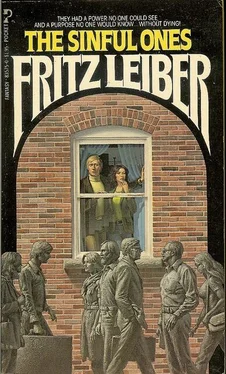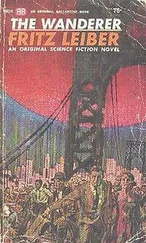Half a block from General Employment he met Tom Elvested. They exchanged comments on the weather. Something was nagging at Carr’s mind, though, as they entered the office. There was a question he’d been meaning to ask Tom, but now he’d forgotten what it was.
Miss Zabel looked up from the rose she was posing in a slim-necked glass vase. She smiled at him. He smiled back. Then he noticed that the calendar pad on her desk said “Friday.” He started to say something, then glanced surreptiously at the dateline of his paper. He felt mildly astounded. It was Friday. And he’d been thinking it was Thursday—or had he? This damn job gave you softening of the brain—couldn’t even remember the day of the week. Oh, well, so much better. Made it that nearer the week-end. And he’d see Marcia tonight. Was his tux in shape? Of course.
He’d no sooner settled himself at his desk and got his things arranged than his first applicant appeared, and thereafter they came in a steady stream. Business was very brisk for a Friday. He had something to occupy him every minute.
In spite of that, after the first hour he began to get some more of those flashes of uneasiness that had troubled him in the bus. Little flickers of apprehension that came without warning and departed with a guilty swiftness, as if they had no right to be in his mind. For no good reason, certain things bothered him. The glass panel. The clock. A stubby end of pencil on his desk. Tom Elvested’s back, which seemed so bulky. Miss Zabel’s teetering walk.
He rather expected lunch with Tom and the gang to shake him out of his mood. But it almost made Carr ache to listen to Tom Elvested mouthing stale cracks about the coming election, between businesslike forksful of Hungarian goulash. He knew very well that Tom was an intelligent, discerning chap, but to listen to him now you’d swear he’d swallowed a phonograph record with last month’s news commentary on it.
Ernie and Acosta were as bad, and the fact that he himself felt more or less like a nervous robot was no consolation at all. The waitress seemed to be forever bringing their checks.
To top it, Tom had to lag behind with him on the way out and start talking about that intellectual girl-friend of Midge’s and how they must have a date sometime together. It was all he could do to keep from being rude.
When he got back to the office his mood was worse than ever. He gritted his teeth. It was turning into one of those frightful fays when every nod and smile takes an effort and you have to purse your lips or clench your fists under the desk in order to understand what people are saying.
One of those days when it’s hard to keep track of what you’re doing. He found he’d picked up the phone and dialed Marcia’s number without any memory of the thoughts leading up to the action.
“Could we have dinner before the party tonight?” he asked her. “I’d like to talk to you.”
“Sorry, but I can’t make it. But if you call for me about eight, we might stop somewhere for a drink.”
“Swell.” He felt there was something he wanted to say to her, now, but he couldn’t think what it was before she hung up.
Just then he heard the scrape of boots and saw a dumpy man in blue jeans approaching his desk—and felt patches of gooseflesh break out on his back.
Oh, he remembered the little man well enough from the day before yesterday. The trouble was that the figure stood out too vividly in his memory, like something in a nightmare.
He could remember with a feverish distinctiveness almost every word the man had spoken, the exact intonations, each gesture he had made.
He could picture precisely how the man smoked a cigarette.
But there were the most frightening gaps in his memory. He couldn’t recall a word he himself had said to the man, or how he’d reacted to him, or how he’d handled the man’s application. It was as if the dumpy man floated alone in space, a small blue god.
It was only with the greatest difficulty that he could recall his name—Jimmie Kozacs; and his occupation—magnetic inspector.
And now facing him across the desk, the man had the same quality of excessive reality as Carr’s memory of him. As if he were sitting in the front row of a movie house and the little magnetic inspector, magnified many times, were towering over him on the screen.
Then, as if from a defective speaker at the back of such a movie house, he heard the man say, “Hello, I come about that Norcott job. It wasn’t like they made it out to be.”
Carr was conscious of asking him to sit down, of fumbling for his application blank and record card, of making some sort of conversation. HE was conscious too, as the interview progressed, of Mr. Kozacs’ genially outraged complaints about what they expected a magnetic inspector to do out at Northcott.
But all the while he was hypnotized by Mr. Kozacs’ excessive reality.
To look at that wholesome, reddish face with his upturned nose, and at the stocky, blue-jeaned body, and to be waiting, as it were, for them to get so solid that they’d break through the floor.
To rack your brain as to what conceivable connection there could be between such an innocuous face and formless dread that kept surging through you until you almost wanted to retch.
And all the while to be talking t that face and scribbling memos for it, and finally to bid it goodbye and wish it better luck.
Just then Carr noticed a silly error in Mr. Kozacs’ application blank.
It was the date. It showed their first interview as having occurred on Tuesday, when of course it had been only the day before yesterday—Wednesday.
The dumpy man was just stepping past the next application approaching Carr’s desk. Carr started to call him back and point out the discrepancy.
But before he could speak, his mind returned from the journey it had taken without waiting for his explicit bidding—a quick round-trip to last Sunday and back.
It brought numbing news.
Parts of Tuesday afternoon, Tuesday and Wednesday evenings, and all of Thursday, were blanks.
Maybe today isn’t Friday. Maybe they’re all wrong. Maybe half of Chicago has made a mistake.
No, Mackay! That’s the way to shake your mind loose. That’s the super-highway to the insane asylum. You’ve got to face it.
But what were you doing, then, during those blank spells? What were you doing?
Steady! That’s a question that will have to be left unanswered for the present.
But what are you going to do now?
Go to a psychiatrist? Tell him about your “spells of amnesia”? Have him ask about your childhood, pull down the shade, shine lights in your eyes, work on your nerves—
No! You couldn’t stand that and you know it. That would shake your mind loose for sure.
But there is something you can do. Something that’ll at least keep the road open to sanity and safety. It isn’t spectacular, though it’ll take a sort of courage. You can simply keep doing what you’re supposed to be doing. Go through all the motions of your daily routine without varying them an iota. There’s safety in routine, Mackay. It keeps men going when nothing else will. You know, soldiers in battle, and all that. By following routine, you have the best chance of holding onto your mind.
You can start right now. Stand up—and did it ever occur to you, Mackay, that standing up is an interesting mechanical problem? Your bones are levers, your muscles are motors—you can feel the cables of sinew tighten smoothly. Smile—it gives you a crinkly feeling in your cheek, doesn’t it? Shake hands with the next applicant. Note the moisture. Also the quality of the grip. Vigorous but jerky—that’s a clue to character. Study his face—the smile, the gold fillings in his back teeth, the worried brown eyes yellow-flecked, the ripples of tension in the dusky skin around them, the alert nose, the eczema scars under the powder. That’s a face for you, Mackay, a face to remember.
Читать дальше









